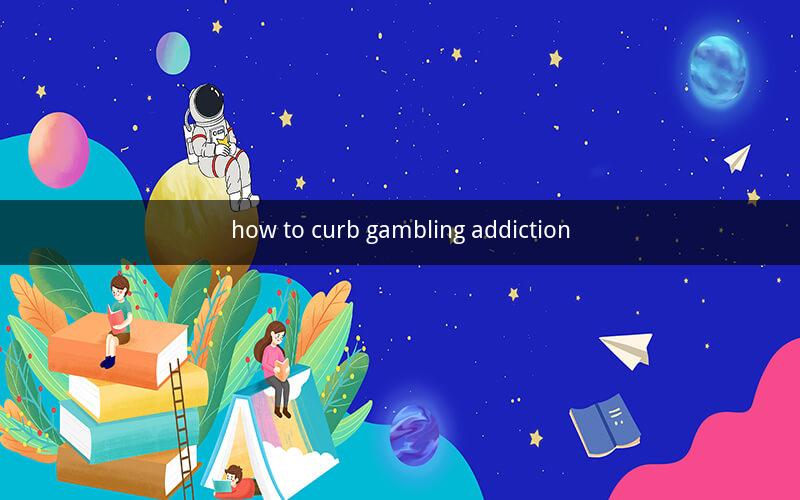
Table of Contents
1. Understanding Gambling Addiction
2. Identifying the Signs of Gambling Addiction
3. The Impact of Gambling Addiction on Individuals and Society
4. Professional Help for Gambling Addiction
5. Self-help Strategies to Curb Gambling Addiction
6. Support Groups and Community Resources
7. The Role of Technology in Curbing Gambling Addiction
8. Legal Measures to Address Gambling Addiction
9. The Importance of Education and Awareness
10. Conclusion
1. Understanding Gambling Addiction
Gambling addiction, also known as compulsive gambling, is a disorder characterized by an uncontrollable urge to gamble, despite the negative consequences. It is a chronic condition that can affect individuals of all ages, genders, and socioeconomic backgrounds. Understanding the nature of gambling addiction is crucial in developing effective strategies to curb it.
2. Identifying the Signs of Gambling Addiction
Recognizing the signs of gambling addiction is the first step in addressing the problem. Some common signs include:
- Preoccupation with gambling, constantly thinking about when you can gamble next
- Needing to gamble with increasing amounts of money to achieve the same thrill
- Feeling restless or irritable when attempting to cut down or stop gambling
- Using gambling as a way to escape problems or negative emotions
- Lying to family, friends, or therapists about the extent of your gambling
- Continuing to gamble despite negative consequences, such as financial, relationship, or legal problems
3. The Impact of Gambling Addiction on Individuals and Society
Gambling addiction can have devastating consequences on both individuals and society. For individuals, it can lead to financial ruin, relationship breakdowns, and even mental health issues. On a broader scale, gambling addiction can strain social services, increase crime rates, and contribute to economic losses.
4. Professional Help for Gambling Addiction
Seeking professional help is an essential component in overcoming gambling addiction. Therapists, counselors, and addiction specialists can provide personalized treatment plans tailored to the individual's needs. Some common treatment approaches include cognitive-behavioral therapy (CBT), motivational interviewing, and group therapy.
5. Self-help Strategies to Curb Gambling Addiction
In addition to professional help, individuals can employ self-help strategies to curb their gambling addiction. These strategies include:
- Setting a budget for gambling activities and sticking to it
- Avoiding trigger situations and places that encourage gambling
- Seeking support from friends, family, or support groups
- Developing healthy coping mechanisms for stress and anxiety
- Educating oneself about the risks and consequences of gambling
6. Support Groups and Community Resources
Support groups and community resources can provide valuable assistance to individuals struggling with gambling addiction. Some popular support groups include Gamblers Anonymous and SMART Recovery. These groups offer a safe, non-judgmental environment where individuals can share their experiences and learn from others.
7. The Role of Technology in Curbing Gambling Addiction
Technology can play a significant role in curbing gambling addiction. Various apps and tools are available to help individuals monitor their gambling behavior, set limits, and receive notifications when they exceed those limits. Additionally, some online platforms offer resources and support for individuals struggling with gambling addiction.
8. Legal Measures to Address Gambling Addiction
Governments and regulatory bodies can implement legal measures to address gambling addiction. These measures may include stricter regulations on gambling advertising, age restrictions, and mandatory self-exclusion programs. Additionally, governments can allocate resources to fund research, treatment, and prevention programs.
9. The Importance of Education and Awareness
Education and awareness are crucial in combating gambling addiction. By promoting understanding of the risks and consequences of gambling, individuals can make informed decisions about their gambling behavior. Educating the public about available resources and support can also encourage individuals to seek help when needed.
10. Conclusion
Gambling addiction is a complex issue that requires a multifaceted approach to address effectively. By understanding the nature of the addiction, identifying the signs, seeking professional help, employing self-help strategies, and utilizing community resources, individuals can take steps towards overcoming their gambling addiction. Moreover, governments, organizations, and individuals must continue to promote education and awareness to prevent gambling addiction from affecting more lives.
Questions and Answers:
1. What is the main cause of gambling addiction?
Gambling addiction is often caused by a combination of factors, including genetics, environmental influences, and personal vulnerabilities.
2. Can gambling addiction be cured?
Gambling addiction is a chronic condition, but it can be managed and controlled with proper treatment and support.
3. How long does it take to recover from gambling addiction?
The duration of recovery from gambling addiction varies from person to person. Some individuals may recover within a few months, while others may require ongoing treatment and support.
4. Are there any medications that can help treat gambling addiction?
Currently, there are no medications specifically designed to treat gambling addiction. However, certain medications may be prescribed to address co-occurring mental health disorders.
5. Can a person with gambling addiction be a responsible gambler?
It is highly unlikely for a person with gambling addiction to be a responsible gambler, as the addiction itself is characterized by an inability to control gambling behavior.
6. How can I help a loved one who is struggling with gambling addiction?
You can offer support by listening, encouraging them to seek professional help, and helping them create a supportive environment.
7. Are there any alternative treatments for gambling addiction?
Yes, alternative treatments such as art therapy, equine-assisted therapy, and mindfulness practices can be beneficial in treating gambling addiction.
8. Can gambling addiction be prevented?
Preventing gambling addiction involves promoting education, raising awareness, and implementing responsible gambling policies.
9. How can I tell if I have a gambling problem?
If you find yourself preoccupied with gambling, experiencing negative consequences, and struggling to control your gambling behavior, you may have a gambling problem.
10. What is the most effective treatment for gambling addiction?
The most effective treatment for gambling addiction is often a combination of cognitive-behavioral therapy, support groups, and personalized strategies tailored to the individual's needs.